语法讲义
专升本英语语法精品讲义ppt课件

9.It was a meeting________importance I did not realize at the time. A.which B.at which C.its D.whose 解析:定语从句修饰meeting,引导词whose在定语从句中
语法专练
1.I have seen the film,________leading actor is my
favourite. A.its B.that C.whose D.which 解析:定语从句修饰film,引导词在定语从句中作 leading actor的定语,表所属关系。 答案:C 2.The girl________everybody had thought could win a gold
的关系,whom作of的宾语。 答案:C
定语从句(二) 1.whom,which在定语从句中可作介词的宾语,这样的介词一
般放在whom,which之前也可放在原来的位置上。that也可作 介词宾语,但介词不能放在that前,只能放在原位置上;含有 介词的固定词组,介词也只能放在原位置上。 This is the nurse to whom Tom spoke just now.=This is the nurse whom Tom spoke to just now. 这就是那个Tom刚才跟她谈话的护士。 The child whom you take care of is ill.你照看的那小孩病了。
码”。后面是倒装句。 答案:C
7.I don’t like the way________he spoke to me. A.what B.by which C.by that D./ 解析:定语从句修饰way,引导词作状语时可用in which/that/不填。 答案:D
现代汉语语法基础知识讲义

第一节概说现代汉语语法基本知识,包括语素、词、短语、句子、句群等五个方面。
语素是汉语中最小的语音语义结合体,也是汉语的一级语言单位。
学好它对于我们把握词语的构成、辨析近义词和同义词有很大的帮助。
词是汉语的二级语言单位。
词的知识包括词的构成、词类等。
短语是汉语的三级语言单位,对于短语结构的熟练把握,有助于我们分析语言结构,从而使我们能够更好地理解语言的意义。
短语知识主要包括短语的类型、短语的结构。
句子是汉语的四级语言单位,这是高考必考的内容,而且是难点、重点。
句子知识主要包括句子的分类、句子的结构、复句类型以及单复句辨析、多重复句等。
句群是汉语的五级语言单位,这个语言单位与语段的层次结构非常相似,只需要了解一下即可。
第二节语素一、语素的概念人类的语言是有声音、有意义的,是语音和语义的结合体,这便是语法单位的基本特征。
语素是最小的语法单位,因此语素就是最小的语音、语义结合体。
它是汉语的一级语法单位。
“最小的语音、语义结合体”是指一个语素在具备语音最小的同时还必须具备语义也最小的特点,二者缺一不可。
我们来看下边这个句子:他坐在沙发里看书。
这是一个最大的语法单位,我们把它尽量小的切分,就成了:他│坐│在│沙发│里│看│书。
切下来的每个部分都有意义,都不能再切分了,是一个一个的语素了。
这里的“沙发”语音上[歌诀]学语素,好处多,理解词义更深刻!语素练习题一、请按要求把下列词语进行归类,只填写序号。
①恍惚②流苏③滥觞④佳丽⑤歇斯底里⑥法西斯⑦仓皇⑧婵媛⑨氤氲⑩啾啾一个语素的有:两个语素的有:二、用横线画出下列句子中的语素1、奥林匹克运动会。
2、我很爱吃巧克力。
3、园中的葡萄熟了。
4、学生在山上植树。
三、用语素知识做下面词语填空题1、依次填入下列各句横线处的词语,恰当的一项是:(1)为把我国软件推向世界,这家公司的总裁把全部精力到多媒体智能软件的研究中。
(2)海峡两岸的统一是人心所向,如长江黄河的滚滚东流,不可。
语法讲义的笔记(自己总结的 未完)

第二章 词的构造
1、句法和词法
句法研究的是句子的内部构造,以词为基本单位,词法研究的是词的内部构造,以语素作为基本单位。
2、合成词的构造方法有重叠、附加和复合三类。
在研究重叠式的时候,应该注意以下几个方面:重叠式的结构类型和语音特征(重音、变调);基式好重叠式的语法功能的异同;重叠式的语法意义。
6、不及物动词只能接准宾语,及物动词除了能带准宾语外,还能带真宾语。有的动词能兼带两种,但意义不同,如他笑你和他笑了。及物动词也不是一定要带着宾语,只有一小部分后头经常带宾语,如散步的散,结婚的结,它们在下列两种情况下也可以不带宾语,一是在回答的时候,一是原来的宾语仍在句子里,不过已转化为其他成分,如,他是去年结的婚。
词语与语素可以通过替换或扩展来区别。但不能一概而论,如我们把“理发”看成词,把扩展以后的格式(理了个发,理不理发)看成词组。洗澡、睡觉、散步、跳舞、上当、吃亏等等跟理发的情形相同。看见、说完、记住、染红、放下、穿上都能有限度的扩展,即插入“得”或“不”,因此我们把它们当作词组看待。
3、词组
5、动词和形容词有一部分可以重叠。有点形容词除了可以按照形容词的方式重叠以外,还可以按照动词的重叠方式重叠。如高高兴兴---高兴高兴,热热闹闹----热闹热闹。这些词兼属形容词和动词(不及物动词)两类。形容词重叠以后不受“很”修饰,因为形容词重叠之后本身就包含量的意义,所以不能用表示量的程度副词修饰它。
第四章 体词
第五章 谓词
1、谓词包括形容词和动词两类。
2、动词和形容词的区别:前边能不能加“很”,后边能不能带宾语。凡受“很”修饰而不能带宾语的是形容词,凡不受“很”修饰或能带宾语的是动词。
3、有的词带宾语时候是动词,不带宾语的时候是形容词,如委屈、端正、死。
【优质讲义】小学英语语法归纳训练讲义-3 名词所有格 全国通用版(含答案)
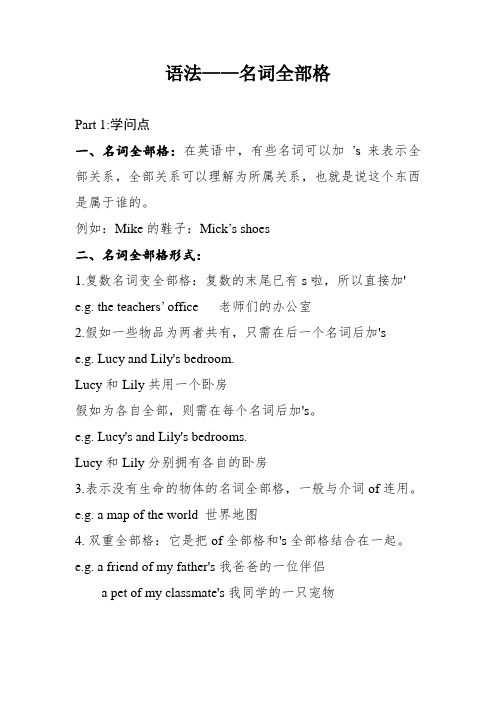
语法——名词全部格Part 1:学问点一、名词全部格:在英语中,有些名词可以加’s 来表示全部关系,全部关系可以理解为所属关系,也就是说这个东西是属于谁的。
例如:Mike的鞋子:Mick’s shoes二、名词全部格形式:1.复数名词变全部格:复数的末尾已有s啦,所以直接加'e.g. the teachers’ office 老师们的办公室2.假如一些物品为两者共有,只需在后一个名词后加'se.g. Lucy and Lily's bedroom.Lucy和Lily共用一个卧房假如为各自全部,则需在每个名词后加's。
e.g. Lucy's and Lily's bedrooms.Lucy和Lily分别拥有各自的卧房3.表示没有生命的物体的名词全部格,一般与介词of连用。
e.g. a map of the world 世界地图4.双重全部格:它是把of全部格和's全部格结合在一起。
e.g. a friend of my father's我爸爸的一位伴侣a pet of my classmate's我同学的一只宠物Part 2:练习1.This is__________________________(田丽的家庭).2.Is that______________________(史密斯家的一幅照片)?3.What’s _________________________(迈克妹妹的名字)?4.This is__________________________(莉莉和露茜的)room.5.They are__________________________(格林夫人的儿子).6.It’s my__________________________(father)bag.7.Are these the_______________________(twin)books﹖8.March 8 is__________________________(woman)Day.9.What’s the girl’s name﹖(同义句)What’s the __________________________the girl﹖10.____________________(李明的父母)work in a big hospital.11.Thi s is____________________________.(我妹妹的英语书)12.________________________(双胞胎的卧房)are very nice.13._________________(王阳和王明的父亲)is a hotel manager.14.Is this_______________________(你的好伴侣的宠物) ?15.They are______________________(Peter 和Sam的老师).16.______________________(老师节) is on September 10th .17._________________________(同学们的桌椅)are very new.18.We are very happy on________________________(儿童节).19.He is in_________________________(老师的办公室) now.20.Please open____________________________(教室的门).21.____________________________(玛丽的鞋)are white.22.____________________(王芳和林浩的学校)is big and new.23._______________(John和Sally的母亲) are American.24.________________(刘伟的妻子的伴侣)is from Guangzhou.25.______________________(Tony哥哥的电脑)is broken.26.It’s_____________________(妇女节) on March 8th.27.Are these__________________________(男生们的书包) ?28.That is_______________________(Tom和李雷的教室).29._________________________(我父亲的和她父亲的伴侣) are from Beijing.答案1. Tian Li’s fa mily2. a picture of Smith’s family3. the name of Mike’s sister4. Lily and Lucy’s5. Mrs. Green’s sons6. fa ther’s7. tw in’s8. Women’s9. name of10. Li Ming’s parents11. my sister’s English book12. The twin’s rooms13. Wang Yang and Wang Ming’s father14. your friend’s pe t15. Peter’s and Sam’s teachers16. Teacher’s Day17. The children’s desks and chairs18. Children’s Day19. the teacher’s office20. the door of the classroom21. Mary’s shoes22. Wang Fang and Lin Hao’s school23. John’s and Sally’s mothers24. The friend of Liu Wei’s wife25. The computer of Tony’s brother26. Women’s Day27. the boys’ bags28. Tom and Li Lei’s classroom29. My father’s and her father’s friends。
现代汉语语法基础讲义
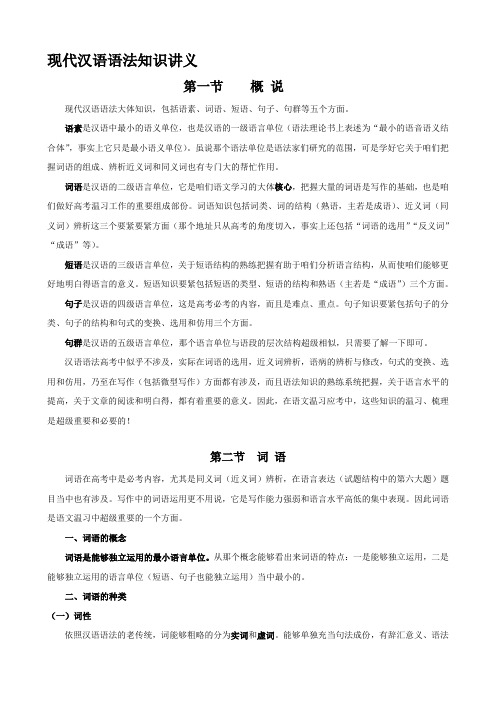
现代汉语语法知识讲义第一节概说现代汉语语法大体知识,包括语素、词语、短语、句子、句群等五个方面。
语素是汉语中最小的语义单位,也是汉语的一级语言单位(语法理论书上表述为“最小的语音语义结合体”,事实上它只是最小语义单位)。
虽说那个语法单位是语法家们研究的范围,可是学好它关于咱们把握词语的组成、辨析近义词和同义词也有专门大的帮忙作用。
词语是汉语的二级语言单位,它是咱们语文学习的大体核心,把握大量的词语是写作的基础,也是咱们做好高考温习工作的重要组成部份。
词语知识包括词类、词的结构(熟语,主若是成语)、近义词(同义词)辨析这三个要紧要紧方面(那个地址只从高考的角度切入,事实上还包括“词语的选用”“反义词”“成语”等)。
短语是汉语的三级语言单位,关于短语结构的熟练把握有助于咱们分析语言结构,从而使咱们能够更好地明白得语言的意义。
短语知识要紧包括短语的类型、短语的结构和熟语(主若是“成语”)三个方面。
句子是汉语的四级语言单位,这是高考必考的内容,而且是难点、重点。
句子知识要紧包括句子的分类、句子的结构和句式的变换、选用和仿用三个方面。
句群是汉语的五级语言单位,那个语言单位与语段的层次结构超级相似,只需要了解一下即可。
汉语语法高考中似乎不涉及,实际在词语的选用,近义词辨析,语病的辨析与修改,句式的变换、选用和仿用,乃至在写作(包括微型写作)方面都有涉及,而且语法知识的熟练系统把握,关于语言水平的提高,关于文章的阅读和明白得,都有着重要的意义。
因此,在语文温习应考中,这些知识的温习、梳理是超级重要和必要的!第二节词语词语在高考中是必考内容,尤其是同义词(近义词)辨析,在语言表达(试题结构中的第六大题)题目当中也有涉及。
写作中的词语运用更不用说,它是写作能力强弱和语言水平高低的集中表现。
因此词语是语文温习中超级重要的一个方面。
一、词语的概念词语是能够独立运用的最小语言单位。
从那个概念能够看出来词语的特点:一是能够独立运用,二是能够独立运用的语言单位(短语、句子也能独立运用)当中最小的。
现代汉语语法讲义
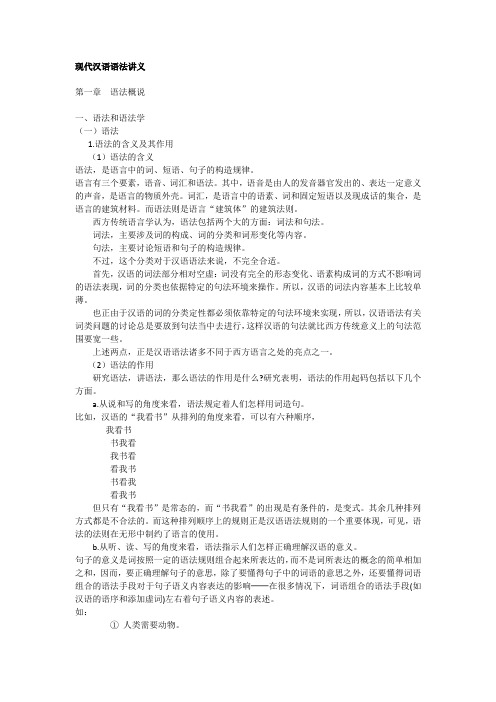
现代汉语语法讲义第一章语法概说一、语法和语法学(一)语法1.语法的含义及其作用(1)语法的含义语法,是语言中的词、短语、句子的构造规律。
语言有三个要素,语音、词汇和语法。
其中,语音是由人的发音器官发出的、表达一定意义的声音,是语言的物质外壳。
词汇,是语言中的语素、词和固定短语以及现成话的集合,是语言的建筑材料。
而语法则是语言“建筑体”的建筑法则。
西方传统语言学认为,语法包括两个大的方面:词法和句法。
词法,主要涉及词的构成、词的分类和词形变化等内容。
句法,主要讨论短语和句子的构造规律。
不过,这个分类对于汉语语法来说,不完全合适。
首先,汉语的词法部分相对空虚:词没有完全的形态变化、语素构成词的方式不影响词的语法表现,词的分类也依据特定的句法环境来操作。
所以,汉语的词法内容基本上比较单薄。
也正由于汉语的词的分类定性都必须依靠特定的句法环境来实现,所以,汉语语法有关词类问题的讨论总是要放到句法当中去进行,这样汉语的句法就比西方传统意义上的句法范围要宽一些。
上述两点,正是汉语语法诸多不同于西方语言之处的亮点之一。
(2)语法的作用研究语法,讲语法,那么语法的作用是什么?研究表明,语法的作用起码包括以下几个方面。
a.从说和写的角度来看,语法规定着人们怎样用词造句。
比如,汉语的“我看书”从排列的角度来看,可以有六种顺序,我看书书我看我书看看我书书看我看我书但只有“我看书”是常态的,而“书我看”的出现是有条件的,是变式。
其余几种排列方式都是不合法的。
而这种排列顺序上的规则正是汉语语法规则的一个重要体现,可见,语法的法则在无形中制约了语言的使用。
b.从听、读、写的角度来看,语法指示人们怎样正确理解汉语的意义。
句子的意义是词按照一定的语法规则组合起来所表达的,而不是词所表达的概念的简单相加之和,因而,要正确理解句子的意思,除了要懂得句子中的词语的意思之外,还要懂得词语组合的语法手段对于句子语义内容表达的影响──在很多情况下,词语组合的语法手段(如汉语的语序和添加虚词)左右着句子语义内容的表述。
英语语法讲义

四级语法讲义一:时态:所谓的"时态",就是时间+状态。
谓语动词的时态见下表:1.主动形式2.被动形式CET-4 常考的三种时态:过去完成时;将来完成时;(现在/过去)完成进行时。
时间状语从句当中的时态:一般过去时 所有的过去 用 一般现在时 表示 现在和将来 现在完成时 现在完成和将来完成一.非谓语动词一.不定式:一)不定式的常考形式:1) 一般形式:He decided to work harder in order to catch up with the others. 被动形式: He preferred to be assigned some heavier work to do.语法功能: 表示与谓语动词同步发生2) 完成形式:He pretended not to have seen me. 被动形式:The book is said to have been translated into many languages.语法功能:表示发生在谓语动词之前 二)不定式常考的考点:1)不定式做定语----将要发生过去 现在 将来 过去将来 一般 diddowill/shall do should/would do进行 was/were doing am/is/are doing will/shall be doing /完成had donehave/has donewill/shall have doneshould/would have done 用于虚拟语气完成进行 had been doing have/has been doing //过去现在将来过去将来 一般 was/were given am/is/are givenwill/shall be givenshould/would be given进行 was/were being givenam/is/are being given//完成had been givenhave/has been givenwill/shall have been given should/would have been given完成进行 / //2)不定式做状语----目的3)不定式充当名词功能---To see is to believe.三)不定式的省略1)感官动词see, watch, observe, notice, look at, hear, listen to, smell, taste, feel+ do表示动作的完整性,真实性;+ doing表示动作的连续性,进行性I saw him work in the garden yesterday.昨天我看见他在花园里干活了。
现代汉语讲义(第四章语法)
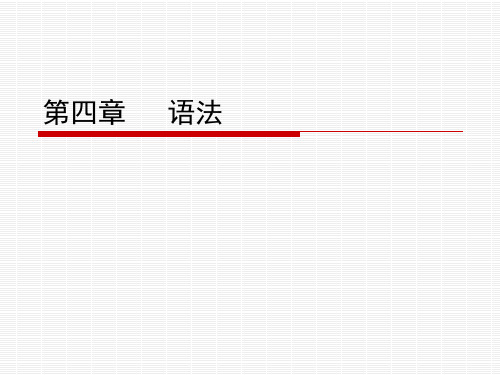
(五)语助词 助词表示某种特定的附加语法意义, 语气词主要表示句子的语气。
1.助词:黏着在词或短语上面,表示附 加意义,附着在后面的一律读轻声。 助词的分类:结构助词、时态助词、 其他助词。
2.语气词:一般用于句末表示语气,永 远黏着、后附、轻声。也可用于句中,主 要用在主语后。 语气词的分类:表陈述、疑问、祈使、 感叹语气四类。
二、单句
1.主谓句 (1)动词性谓语句 可分为动词谓语句、述宾谓语句、述 补谓语句、连谓谓语句、兼语谓语句、 主谓谓语句。 (2)形容词性谓语句 形容词谓语句、形补谓语句。 (3)名词性谓语句 名词谓语句、数量谓语句、定心谓语 句。
2.非主谓句。 (1)名词性非主谓句 (2)动词性非主谓句 (3)形容词性非主谓句 (4)特殊非主谓句
3.偏正词组:前面的成份(修饰语)修饰 限定后面的成份(中心语)。可分为体词性 的和谓词性的两类。 修饰语是定语的称为定心词组,是名词性 词组。 修饰语是状语的称为状心词组,是谓词性 词组。
4.述补词组:补充与被补充的关系。 根据带不带结构助词“得”可分为:(1) 数量补语:量词结构作补语,不能带“得” ;(2)情态补语:补语说明动作或有关事务 的状态,必须带“得”;(3)结果补语:补 语表示动作的结果,可由形容词或动词充当 ,不带“得”;(4)趋向补语:补语表示动 作的趋向,不带“得”;(5)可能补语:补 语表示可能性或不可能性,由结果补语和趋 向补语中间插入“得/不”;(6)程度补语 :补语表示程度,由副词构成。
三、存现句 存现句的类别。
四、把字句 把字句的特点。
五、被字句 被字句的特点及变体。
第八节 句类系统
句类是按照句子的语气功能划分出 来的类型系统。
一、陈述句 语气词及否定形式。
高考英语一轮复习语法总结讲义
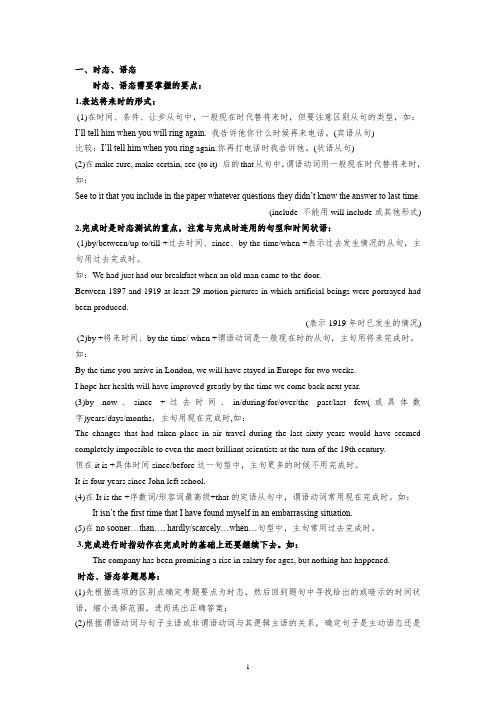
一、时态、语态时态、语态需要掌握的要点:1.表达将来时的形式:(1)在时间、条件、让步从句中,一般现在时代替将来时,但要注意区别从句的类型,如:I’ll tell him when you will ring again. 我告诉他你什么时候再来电话。
(宾语从句)比较:I’ll tell him when you ring again.你再打电话时我告诉他。
(状语从句)(2)在make sure, make certain, see (to it) 后的that从句中,谓语动词用一般现在时代替将来时,如:See to it that you include in the paper whatever questions they didn’t know the answer to last time.(include 不能用will include或其他形式) 2.完成时是时态测试的重点,注意与完成时连用的句型和时间状语:(1)by/between/up to/till +过去时间、since、by the time/when +表示过去发生情况的从句,主句用过去完成时。
如:We had just had our breakfast when an old man came to the door.Between 1897 and 1919 at least 29 motion pictures in which artificial beings were portrayed had been produced.(表示1919年时已发生的情况) (2)by +将来时间、by the time/ when +谓语动词是一般现在时的从句,主句用将来完成时。
如:By the time you arrive in London, we will have stayed in Europe for two weeks.I hope her health will have improved greatly by the time we come back next year.(3)by now、since +过去时间、in/during/for/over/the past/last few(或具体数字)years/days/months,主句用现在完成时,如:The changes that had taken place in air travel during the last sixty years would have seemed completely impossible to even the most brilliant scientists at the turn of the 19th century.但在it is +具体时间since/before这一句型中,主句更多的时候不用完成时。
语法讲义( 冠词)

语法课讲义(一)一学习目标1 不定冠词和定冠词的功能2 零冠词的几种情况二知识要点1 冠词在数量上只有3个,分类如下:不定冠词(a/an)冠词定冠词(the):冠词不是单用词,其后必须跟名词,中间可加修饰词。
三具体应用不定冠词1位置单数可数名词前2 方法a+辅音音素an+元音音素功能1 表示“一”这个数量概念a book 一本书 a chair 一把椅子 a university 一所大学an orange 一个橙子an hour 一个小时an egg 一个鸡蛋2 表示“每一”这个频率概念I go to school five days a week. She usually cleans her house twice a week. The pork is 20 yuan a kilo.3 使抽象内容具体化have a cold=catch a cold 感冒have a good time 玩得开心不定冠词的常用短语a knife and fork 一副刀叉want a go 试一下as a result 因此in a word 总之take a break 休息一会儿all of a sudden 突然as a matter of fact 事实上have a swim 游泳take a walk = go for a walk 散步定冠词定冠词的功能与使用1 上文提到过的人或物再次提到There is a man. The man has a hen. The hen gives him a golden egg every day. This is a yo-yo and the yo-yo is Tom’s.2 特指双方都明白的人或物Look at the blackboard. The girl in pink is my sister.in the east in the south in the west in the northon the right on the leftin the past at the present in the future3 宇宙间“独一无二”的天体名称之前the sky the moon the sun the earth the world4 the 加姓的复数代表某某一家人,永远都当复数看The Whites are watching TV now.Mr. Kings often visit their neighbor on weekend.5 the 用在乐器名称前play the guitar play the piano play violin6 the加形容词代表一类人或事物通常谓语动词用复数the old 老人the young 年轻人the poor 穷人The old need our help and care. 老人需要我们的帮助和关怀。
语法讲义

第一部分虚拟语气的用法要点一.Should+动词原形型1.坚决要命型:在“建议”propose, suggest, advise,recommend,“决定”insist,decide,“要求,需要”require, demand, request, ask,“命令”order等动词后的宾语从句中要求用虚拟语气,其形式是should +动词原形,should可以省略。
1)He proposed that we (should) set up a committee to look into the matter. 他提议我们建立一个委员会来调查此事。
2)He wanted to go to Paris, but the doctor asked that he not go.他想去巴黎,但医生要他别去。
We advised that they should start early.我们建议他们及早开始。
I’m not the person to recommend how the job should be done.我不是能为做此事出主意的人。
2.与上述动词相关的主语从句及同位语从句中也要求用虚拟语气,其形式是should+动词原形,should可以省略。
如:It has been ordered that no one should go to bed until further information.命令说没有进一步的通知谁都不能休息。
It was suggested that measures be taken to minimize the damage.有人建议采取措施把损失降到最小。
My proposal is that he be in charge of the whole thing.我建议由他来负责整件事。
3.在含有形容词necessary(必需的,需要的), important(重要的), essential(必要的,不可缺少的),advisable(明智的,可取的), strange(奇怪的),incredible(难以置信的),vital(至关重要的)等的主语从句中及it’s a pity, it is a shame, it is no wonder等主语从句中要求用虚拟语气,其形式是should+动词原形,should可以省略。
高中英语语法(全)讲义精讲
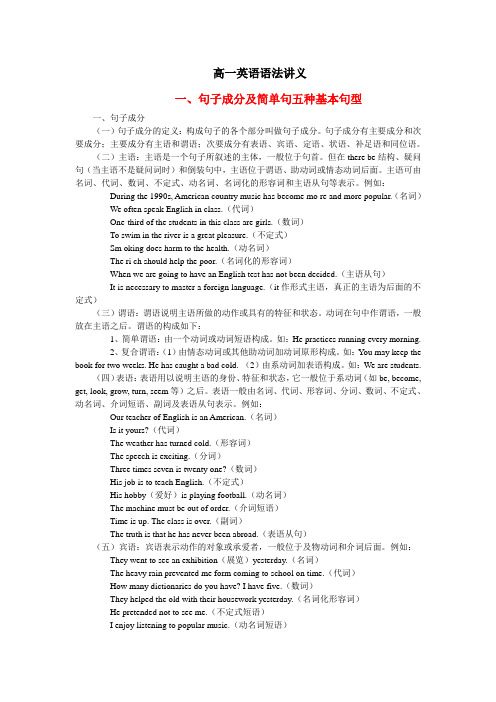
高一英语语法讲义一、句子成分及简单句五种基本句型一、句子成分(一)句子成分的定义:构成句子的各个部分叫做句子成分。
句子成分有主要成分和次要成分;主要成分有主语和谓语;次要成分有表语、宾语、定语、状语、补足语和同位语。
(二)主语:主语是一个句子所叙述的主体,一般位于句首。
但在there be结构、疑问句(当主语不是疑问词时)和倒装句中,主语位于谓语、助动词或情态动词后面。
主语可由名词、代词、数词、不定式、动名词、名词化的形容词和主语从句等表示。
例如:During the 1990s, American country music has become mo re and more popular.(名词)We often speak English in class.(代词)One-third of the students in this class are girls.(数词)To swim in the river is a great pleasure.(不定式)Sm oking does harm to the health.(动名词)The ri ch should help the poor.(名词化的形容词)When we are going to have an English test has not been decided.(主语从句)It is necessary to master a foreign language.(it作形式主语,真正的主语为后面的不定式)(三)谓语:谓语说明主语所做的动作或具有的特征和状态。
动词在句中作谓语,一般放在主语之后。
谓语的构成如下:1、简单谓语:由一个动词或动词短语构成。
如:He practices running every morning.2、复合谓语:(1)由情态动词或其他助动词加动词原形构成。
如:You may keep the book for two weeks. He has caught a bad cold. (2)由系动词加表语构成。
雅思英语语法讲义
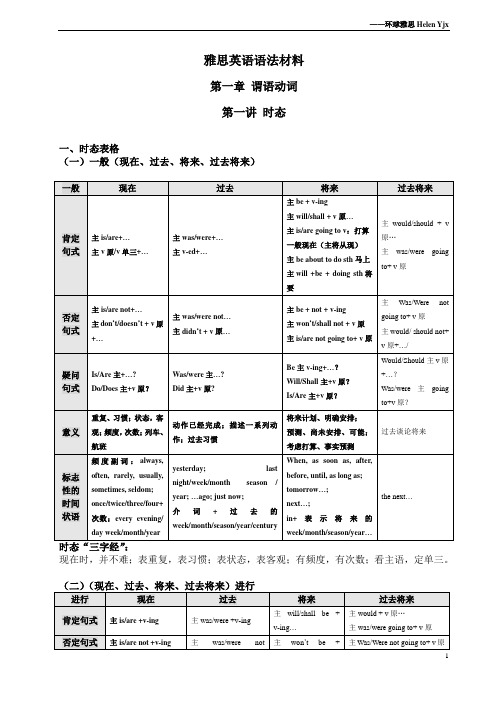
雅思英语语法材料第一章谓语动词第一讲时态一、时态表格(一)一般(现在、过去、将来、过去将来)现在时,并不难;表重复,表习惯;表状态,表客观;有频度,有次数;看主语,定单三。
(三)(现在、过去、将来、过去将来)完成(四)(现在、过去、将来、过去将来)完成进行二、基本时态演练Listening to the following conversation.(一) Task One: fill in the blanks.1. Interviewer: Your name?Peter: Peter __________. (1)2. Interviewer: ________ (2) you work or _________ (3) you a student?Peter: I’m studying really hard for my exams this month—I’m doing math’s at university—but I also________ (4) my parents out. They own a _________ (5) and I ________ (6) there as a waiter in the evenings, so I ____________ (7) a lot of free time during the week.My mom is always saying that I _____________ (8) enough in the restaurant! But I do manage to find some free time most days.3. Interviewer: Can you look at the _____ (9) and tell me whether you do any of these things and if so, how ____ (10)?Peter: I love music and I’m learning to play the piano. I ______ (11) really early and practice for an hour or so just about every day. I also play the guitar in a band with some other friends. We used to practice together at least _____________ (12) a week but these days we only manager to meet about once __________________ (13).4. Interviewer: What about the next thing on the list? -_________________ (14)?Peter: Well, I used to play them all the time but now I’m too busy studying and I _______ (15) miss them at all.5. Interviewer: Do you use a computer for other things?Peter: I use the Internet just about ________ (16) for my studies. And I also use it to _____________ (17) my friends and my family. My cousin is living in Thailand at the moment and he _______ (18) me regular emails to let me know how much fun he’s having! He’s always visiting exciting places.6. Interviewer: Now, how about _________________ (19)?Peter: Actually, I joined the local football team when I was at school and I still play _______________ (20) provided I can get to training. I much prefer playing football to watch it on TV, though I do ______________ (21) watch a match if there’s a big final or something.7. Interviewer: What about going to watch live matches?Peter: I’d love to be able to afford to go every week because I ____________ (22) my local team, but students don’t ____________ (23) have much money, you know! I can remember the ___________ (24) I went to a live match. Oh, sorry, I can see my friends—I ____________ (25)go now!(二)Task TwoRead through the conversation and find out:1. Present simple sentences:2. Present continuous:3. Past simple sentences:三、时态改错1. People should act according to what they are believing.2. In general, I think our government spent too much money on space travel.3. Nowadays, many people in my country have sent their children to single-sex schools.4. These days, more and more people traveling to very distant places for their holidays.5. I am hoping it is not too late to save the environment.6. The female hen laying on average 5 or 6 eggs per week.7. Younger drivers is more likely to be involved in a car accident.8. Most doctors are agreeing that the only way to lose weight is by doing more exercise.第二讲语态一、被动语态的形式二、被动语态使用情景(一)一般说来,当强调动作承受者,不必说出执行者或含糊不清的执行者时,多用被动式1. I agree with the statement that there should be no government restriction on creative artists who express themselves in the way they do and that they must be given freedom for the same. (IELTS 4, Band 7, p167)2. There is almost everything good in what is given to us through the media world which is made up of artists. (同上)3. In conclusion, I strongly agree with that children should be taught to cooperate rather than compete. (IELTS 5, Band 6, p167)4. It was opened in the year 1863, and it is already 140 years old. (IELTS 5, Band 7, p168)(二)在描述事件和客观事实的时候,被动语态用得更多1. The use of electricity in England is indispensed with. (IELTS 4, Band 6, p164)2. Demand for electricity in England during typical days in winter and summer is illustrated in the graph. (同上)3. The use of average English home is shown in the pie chart. (同上)(三)主语是泛指很多人或者大部分人这个方面1. A more dramatic rise is predicted between 2030 and 2040 in Japan, by which it is thought thatthe proportion of elderly people will be similar in the three countries. (IELTS 5, model answer, p162)2. It can be argued that…It is advised/believed/universally accepted/generally recognized that…It is said/reported/estimated that…(四)当上下文已经说明了动作执行者时:A law was introduced to help protect people in this situation.(五)动作的执行者并不重要时:In the factory, the shoes are cleaned and packed into boxes ready for sale.(六)需要体现动作的执行者时,加by-短语:A lot of waste materials could be recycled by large manufacturers.三、剑指考试1. To enrich vocabulary, we should read more authentic materials.可以改为:(1)(2)(3)2. It is important for nations all over the world to work hard together to control the environmental pollution.可以改为:3. I am not sure whether all the college graduates can find jobs after graduation.可以改为:4. 用适当的动词形式完成下列句子:(1)My home _____________ (locate) in the western part of the city.(2)These funds can _____________ (give) to the poorer people to help them.(3)We _____________ (not tell) that the rules had changed.(4)Children need to _____________ (teach) the correct way to behave in public.5. 句子改错:(1)The house was sell for over a million dollars.(2)The class has allowed to eat in the staff dining room during the renovations.(3)The potatoes carry along a conveyor belt to a room where they wash and peel. (4)The teacher told to take her class out of the school if the fire bell rang.(5)Smoking don’t allow in any part of the aeroplane.(6)The museum was being renovating when we were there, so we could not visit it. (7)Bus tickets can buy at any newsagents.(8)New employees have instructed not to operate the photocopier until they are trained.6. 把下面的句子改成被动语态,并决定是否需要带by-短语(1)A factory worker checks each box for quality.(2)The government does not permit children under 16 to work.(3)The washing machine is washing your clothes at the moment.(4)A mechanic will repair your car this afternoon.(5)The agent has sold our house at last.(6)Something tore the back of my coat.(7)The employer pay off the staff more for working at the weekend.(8)Burning tires give off highly toxic chemicals.第三讲虚拟语气请欣赏下列一首诗歌:If you were a teardrop in my eye,For fear of losing you, I would never cry.And if the golden sun should cease to shine its light,Just one smile from you would make my whole world bright.一、虚拟语气基本句型1. 与现在事实相反(1) If she were sick, she could stay at home and have a rest today.(2) If you watched more and talked less, we would both enjoy our film.2. 与过去事实相反(1) If they had studied earlier, they would have passed the IELTS.(2) Helen would have graduated with her class if she had been able to meet all the requirements in time.3. 与将来事实相反(1) If it snowed tomorrow, I would go skiing.(2) If it should snow tomorrow, I would go to make a snowman in front of our dormitory.(3) If you were to see your tutor, what would you tell him?4.错综的虚拟语气(1) If I were you, I wouldn’t have told that to her. (时间错综:从句现在,主句过去)(2) Had I taken my umbrella with me in the morning, I should not be wet now. (时间错综:从句过去,主句现在)5.虚拟语气的倒装可以把条件句中的if 省略掉,同时把should, were, had 等助动词提前,构成倒装句。
2023届高考英语重点语法总结复习讲义

高三重点语法总结复习1.the same...that... 和...一样We don’t have the samework hours that office workers in the city office have.2.so+adj/adv+that; such+n+that;如此...以至于〔结果状从〕The newlybuilt stadium is so big that it can hold all the teachers and students in our school.倒装变式;So big is the newlybuilt stadium that it can hold all the teachers and students.3.so that以便...,目的是...〔缘由状从〕I read more books so that I can catch up with my classmates.4.be doing ...when正在做某事...突然She was walking along the bank of the river when she heard a cry for help.5.with/make /leave+宾语+宾补With the current world conditions forcing us to stay longer indoors,you’ve likely tried to pick up a new skill.We should take effective measures to ptotect our planet,making it a more beautiful place.6.when/while/if/as+adj/非谓语〔状语从句的省略:当从句的主语和主句的主语全都或从句的主语为it时,且从句的谓语动词含有be动词时,可以把从句中的主语和be动词一起省去〕While+doing; if possible/necessary; as planned/shecduled/arrangedTwo years later.the worker was caught in Italy when trying to selling the painting.7.祈使句+and+陈述句;表示承接8 祈使句+or+陈述句;表示转折Give me a challenge,and I’ll meet it with joy.Please e here,and you will interested in papercuting.8.It is said that=Sb/Sth is said to do 〔据说句型,从句和不定式的相互转化〕On this day,the moon is said to be its biggest and brightest.On this day,it is said that the moon is biggest and brightest.9.be+adj+to dois easy to do;is hard to doAlthough the work was not easy to do,we felt happy and satisfied.10.表示方位的介词短语或表示时间,地点,方位的副词放于句首时,句子要半倒装常见的有:among;then ;inUnder the big tree was sitting an old farmer.11.常见的主语从句的四种类型:It is +adj+thatIt is +过去分词+thatIt is +名词短语+thatIt is +不及物动词〔happen,occur,appear,seem...〕+thatIt is clear that we are going to see a huge growth in shopping on the internet.12.I t+现在完成时+since+一般过去时;“自从...已经有多长时间了〞It has been two weeks since you went back home.13.n ot..until“知道...才〞Not until I received your last letter did I learn your keen interest in Chinese culture. 14.w hether...or“无论是...还是〞If he is out there every day and playing hard,you should praise his effort regardless of whether his team wins or loses.15.否认词+比拟级“表示最高级〞Nothing is more difficult than that.16.c an not/never/hardly be too +adjcan not/never/hardly be adj+enough “再...也不为过〞You can never be too careful when you cross the road.17.I t is/was...who/that...强调句.I know it is one of chinese traditional art formspapercutting that you are interested in.So I invite you to attend an exhibition of it.The more you know about papercutting,the better you will love it.18.t hat引导的同位语结构某些抽象名词后,如:fact,hope,idea,news,belief,sign等后,常跟that引导的同位语从句There is no doubt that you are supposed to know about the history of the Tang Dynasty in advance.There are no signs that Tom was a rich man.19.b e of +adj+n=be of +adjbe of great value=be valuable; be of great help=be helpfulbe of great significance=be significant; be of great benefit=be beneficialI do hope these suggestions above will be of some help to you.20.a s long as“只要;引导条件状语从句〞This proves that as long as we have a strong will ,we’ll be able to get over any difficulty.21.h ave a difficult 〔in〕doing sth“有一段困难的时间〞I had a difficult time 〔in〕adjusting to the learning environment when I first entered the new school.22.t he last time“上次〞引导时间状语从句,不和when连用I still remember you showed me some photos on that theme the last time you visited our school.23.t hat’s why“那就是为什么...〞that’s because“那是由于〞That’s why I think the trip along the Yangtze River will be a better choice.Form the space,the earth looks blue. This is because about sevenone percent of its surface is covered by water.24.T he reason why...is that...“...的缘由是...〞The reason why I show respect for her is that she never loss temper instead always encourage me.25.t he +比拟级,the+比拟级“越...越〞The more you give,the more you will get.〔付出越多,收获越多〕26.t he moment“一...就〞引导时间状语从句Generally speaking,we are busy reviewing and preparing for the College EntranceExamination the moment we enter senior three.27.n ot...but...“不是...而是〞V oters sometimes feel annoyed,not because they hate voting,but because they don’t like being forced to do so.28.I t’s high time that sb +一般过去时/should +动词原形“到了该做某事的时间了〞It/This/That is/was the+序数词time that sb+现在完成时/过去完成时某人第几次做某事It’s high time that we devoted /should devote ourselves to environmental protection and ecological improvement.It’s the second time that I have been to Shanghai.29.s o所引导的倒装句:so+be动词/助动词/情态动词+主语Tom likes to keep pets and so does his wife.〔汤姆喜爱养宠物,他妻子也一样〕30.g et+过去分词31.N o sooner +过去完成时+thanhardly+过去完成时+when“一...就〞No sooner had Mo Yan stepped on the stage than the audience broke into thunderous applause.32.m ake用法make sb do sth让某人做某事;sb be made to do sth被人被要求做某事make it +adjmake oneself doneThe boss made the worker do the work all day.The purpose of new technologies is to make life easier,not to make it more convinent. She managed to make herself understood in English.。
高考英语语法知识讲解(同位语和插入语+主补和宾补+系动词和实义动词)+讲义
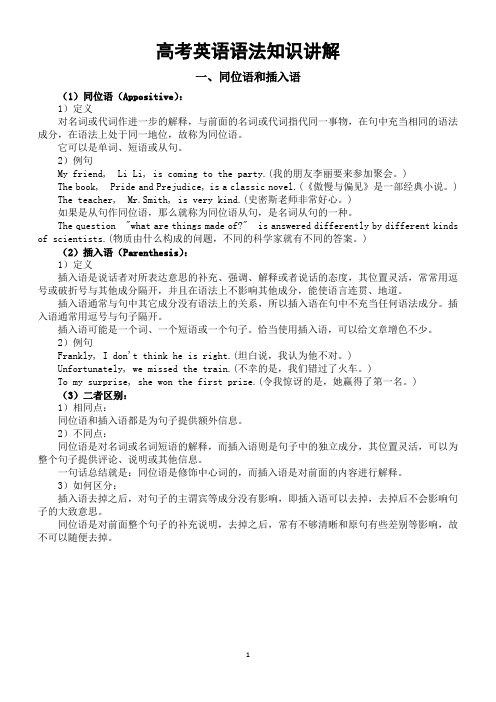
高考英语语法知识讲解一、同位语和插入语(1)同位语(Appositive):1)定义对名词或代词作进一步的解释,与前面的名词或代词指代同一事物,在句中充当相同的语法成分,在语法上处于同一地位,故称为同位语。
它可以是单词、短语或从句。
2)例句My friend, Li Li, is coming to the party.(我的朋友李丽要来参加聚会。
)The book, Pride and Prejudice, is a classic novel.(《傲慢与偏见》是一部经典小说。
) The teacher, Mr.Smith, is very kind.(史密斯老师非常好心。
)如果是从句作同位语,那么就称为同位语从句,是名词从句的一种。
The question "what are things made of?" is answered differently by different kinds of scientists.(物质由什么构成的问题,不同的科学家就有不同的答案。
)(2)插入语(Parenthesis):1)定义插入语是说话者对所表达意思的补充、强调、解释或者说话的态度,其位置灵活,常常用逗号或破折号与其他成分隔开,并且在语法上不影响其他成分,能使语言连贯、地道。
插入语通常与句中其它成分没有语法上的关系,所以插入语在句中不充当任何语法成分。
插入语通常用逗号与句子隔开。
插入语可能是一个词、一个短语或一个句子。
恰当使用插入语,可以给文章增色不少。
2)例句Frankly, I don't think he is right.(坦白说,我认为他不对。
)Unfortunately, we missed the train.(不幸的是,我们错过了火车。
)To my surprise, she won the first prize.(令我惊讶的是,她赢得了第一名。
)(3)二者区别:1)相同点:同位语和插入语都是为句子提供额外信息。
现代汉语语法讲义(DOC)
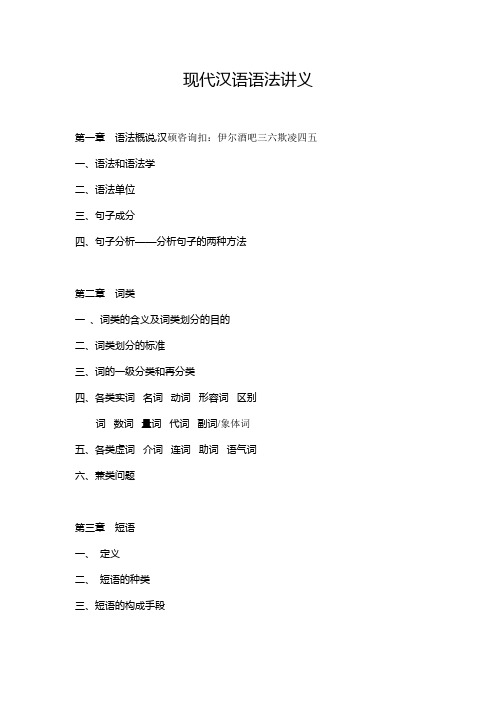
现代汉语语法讲义第一章语法概说,汉硕咨询扣:伊尔酒吧三六欺凌四五一、语法和语法学二、语法单位三、句子成分四、句子分析——分析句子的两种方法第二章词类一、词类的含义及词类划分的目的二、词类划分的标准三、词的一级分类和再分类四、各类实词名词动词形容词区别词数词量词代词副词/象体词五、各类虚词介词连词助词语气词六、兼类问题第三章短语一、定义二、短语的种类三、短语的构成手段四、简单短语和复杂短语五、单义短语和多义短语六、自由短语和固定短语七、短语和词宏观上的同与异第四章句子成份一、句子成分的性质二、主语、谓语主语的语法构成主语的语义类型谓语的语法构成三、动语、宾语动语的语法构成有宾动词无宾动词宾语的语法构成宾语的语义类型四、定语五、状语六、补语补语的语法构成补语的语义类型宾语、补语的顺序数量宾语和数量补语七、中心语八、独立语第五章单句一、基本概念二、句型确定的原则和方法三、主谓句主谓谓语句双宾语句连动句兼语句存现句“把”字句“被”字句“是”字句“有”字句“所”字句四、非主谓句五、单句和短语第六章歧义分析一、歧义的含义及歧义研究的目的二、歧义的种类(1)同音造成的歧义同形造成的歧义一词多义造成的歧义词兼类造成的歧义语义关系不同造成的歧义三、歧义的种类(2)第七章复句一、复句的含义二、复句中的关系词语三、复句的分类四、广义的并列关系五、广义的因果句因果关系目的关系假设关系条件关系六、广义的转折句七、复句的扩充八、复句的紧缩第一章语法概说一、语法和语法学(一)语法1.语法的含义及其作用(1)语法的含义语法,是语言中的词、短语、句子的构造规律。
语言有三个要素,语音、词汇和语法。
其中,语音是由人的发音器官发出的、表达一定意义的声音,是语言的物质外壳。
词汇,是语言中的语素、词和固定短语以及现成话的集合,是语言的建筑材料。
而语法则是语言“建筑体”的建筑法则。
西方传统语言学认为,语法包括两个大的方面:词法和句法。
词法,主要涉及词的构成、词的分类和词形变化等内容。
- 1、下载文档前请自行甄别文档内容的完整性,平台不提供额外的编辑、内容补充、找答案等附加服务。
- 2、"仅部分预览"的文档,不可在线预览部分如存在完整性等问题,可反馈申请退款(可完整预览的文档不适用该条件!)。
- 3、如文档侵犯您的权益,请联系客服反馈,我们会尽快为您处理(人工客服工作时间:9:00-18:30)。
第一节形容词和副词一、形容词I.语法作用形容词通常在句中做定语,表语或补语,有时也做状语。
例如:They have a spacious and comfortable living room. 他们有一个既宽绰又舒适的客厅。
This flower smells sweet. 这花闻起来香。
It is never too late to mend. 回头是岸。
They consider this job tough. 他们认为这个任务很困难。
They went home, happy and gay. 他们兴高采烈地回家去了。
注:以a-开头的形容词如alone, alive, ashamed, afraid, afloat等以及content(满意的), well(健康的), ill(生病的), unable(不能的), glad等多作表语。
例如:The two brothers are very much alike. 这两兄弟非常相象。
Like father, like son.I am not feeling very well. 我觉得身体不太舒服。
II.形容词的位置1.单个形容词作定语时,通常放在被修饰的名词前;如果有几个形容词同时修饰一个名词时,它们的排列顺序为:(1.冠词或指示代词 2.所有格 3.序数词 4.基数词) 5.特性,性质(good, pretty) 6.大小,长短,高低 7.年龄,温度,新旧 8.形态,形状(round, square, triangular) 9.颜色 10.国籍,地区,出处 11.物质,材料 12.用途,类别,与…有关(medical, writing ,etc.)+ 被修饰名词。
例如:our great socialist motherland 我们伟大的社会主义祖国the Great Proletarian Cultural Revolutionthe first three fine big old red English stone plantation houses 头三幢漂亮的大的旧的英国的红石头农场房子2.在下列情况下,形容词作定语要后置。
(1)修饰由some, any, no, every构成的复合代词时。
例:Is there anything wrong with the recorder? 这架录音机有毛病吗?This evening I have something special to do.(2)形容词短语作定语修饰名词时。
例如:Have you got all the instruments necessary for the experiment?实验所需的一切设备你买到了吗?Have you got all the instruments ready for the experiment?(3)几个意义相对的形容词修饰名词时。
例如:He had a face, thin and worn, but eager and resolute.他的脸虽然又瘦又憔悴,但是显得既恳切又果断。
(4)形容词与表示数量的短语一起修饰名词时。
例如:It is a road ten meters wide/twenty miles long.It is a ten-metre-wide\twenty-mile-long road.这是一条十米宽/二十英里长的公路。
注:副词here、there、above等或介词短语作定语修饰名词时也要后置。
例如:The table above shows that it is difficult to solve this problem.上述的表说明解决这个问题是困难的。
They have rich experience in practice. 他们有丰富的实践经验。
二、副词I.副词的作用副词在句中主要作状语修饰动词、形容词和副词。
此外,副词还可做表语、复合宾语等。
例如:Time is up. 时间到了。
I saw her out. 我见她出去了。
The weather there is very changeable. 那里气候变化无常。
II.副词的种类根据副词的意义和用法可分为:1.时间副词 例如:then, after, before, today, ago等2.程度副词 例如:very, so, too, rather, quite, almost等3.频度副词 例如:always, often, seldom, rarely等4.地点副词 例如:up, down, near, below, here, there等5.方式副词 例如:bravely, slowly, warmly, fast等6.疑问副词 例如:when, where, how, why等。
7.连接副词 例如:where, when, why, how等8.关系副词 例如:when, where, why等9.语气副词 例如:frankly, certainly, perhaps等III.副词的位置1.修饰形容词、副词和连接词的程度副词常位于被修饰的词前面。
例如:This bike is too expensive. 这辆自行车很贵。
We meet fairly often. 我们经常见面。
Even if we achieve great success in our work, we should not be conceited.即使我们在工作中取得了巨大成绩,也不应该自满。
2.修饰动词的副词多放在动词的后面或及物动词宾语的后面。
例如:He studies English very hard. 他学习英语非常努力。
He always gets up early and goes to bed late. 他总是早起晚睡。
3.修饰整个句子的副词位置较灵活,可位于句首、句中或句末。
例如:Theoretically this test should be a success.orThis test, theoretically, should be a success.orThis test should be a success theoretically. 从理论上讲,这个实验应该成功。
He picked some cotton on the farm yesterday. (only)注:(1)频度副词通常位于行为动词之前,情态动词、助动词和动词to be 之后。
例如:I never forget my daughter’s birthday. 我从不忘记女儿的生日。
He is seldom ill. 他很少生病。
Has he ever been to Beijing? 他曾去过北京吗?(2)几个副词同时出现时,其排列顺序为:方式副词+地点副词+时间副词(常位于句首)。
同类副词同时出现时,小的在前,大的在后。
例如:He sat quietly there very long. 他静静地在那儿坐了很久。
I often get up at 6 o'clock every morning.我每天常常六点起床。
三、 形容词和副词的原级、比较级和最高级的用法I.原级比较结构1.S+V+as+原级+as…. 意为“和……一样”2.S+V+not+as(not+so)+原级+as… 意为“不如…那样”例如:Many of the stars are as hot as the sun. 很多恒星同太阳一样热。
He works as hard as you. 他工作和你一样努力。
Line AB is not as long as Line CD. AB线段与CD线段长度不等。
Wheel A does not revolve so fast as wheel B. A轮没有B轮旋转那样快。
注:原级比较结构的肯定式前可加一倍数或分数。
例如:A is twice as long as B. A的长度是B的两倍。
This substance reacts one tenth as fast as the other one.这种物质的反应速度是另一物质的十分之一。
The weight of this case is five times as heavy as (five times the weight of ) that one. 这个箱子的重量是那个箱子的五倍。
II. 比较级结构1.S+V+比较级+than… 意为“比…更…”。
例如:Steel is stronger than iron. 钢比铁坚固。
This new machine runs better than the old one. 新机器运转得比旧机器好。
2.S+V+less+原级+than… 意为“不如…”。
例如:Her coat is less expensive than yours.她的上衣不及你的贵。
He did the experiment less carefully than you.他做实验不如你仔细。
3.The+比较级+S+V, the+比较级+S+V. 意为“越…就越…”。
例如:The earlier you start, the sooner you will be back. 你动身越早,回来就越快。
The sooner, the better.More haste, less speed.4.S+V+比较级+and+比较级 意为“越来越…”。
例如:The situation is becoming more and more favorable.形势正在变得越来越有利。
注:Of the two+n., S+V+the+比较级或S+V+the+比较级+of the two+n. 意为“…在两个…之中,…较为…”。
(of 后及比较级前必须加定冠词)例如:Of the two young men, he is the stronger. 他是这两个年轻人当中比较强壮的一个。
注:(1) 比较级前可用much, far, a little, a great deal以及倍数和分数等词或短语修饰。
例如:He studies far better than you. 他学习比你好得多。
This year we will produce 20% more cars than we did last year.今年,我们将比去年多生产20%的汽车。
(2) 使用比较级时,要注意比较对象的一致性例如:My sister’s books are more interesting than my brother. (wrong)My sister’s books are more interesting than my brother’s. (right)My sister has more interesting books than my brother(has). (right)我妹妹的书比我弟弟的书更有趣。
